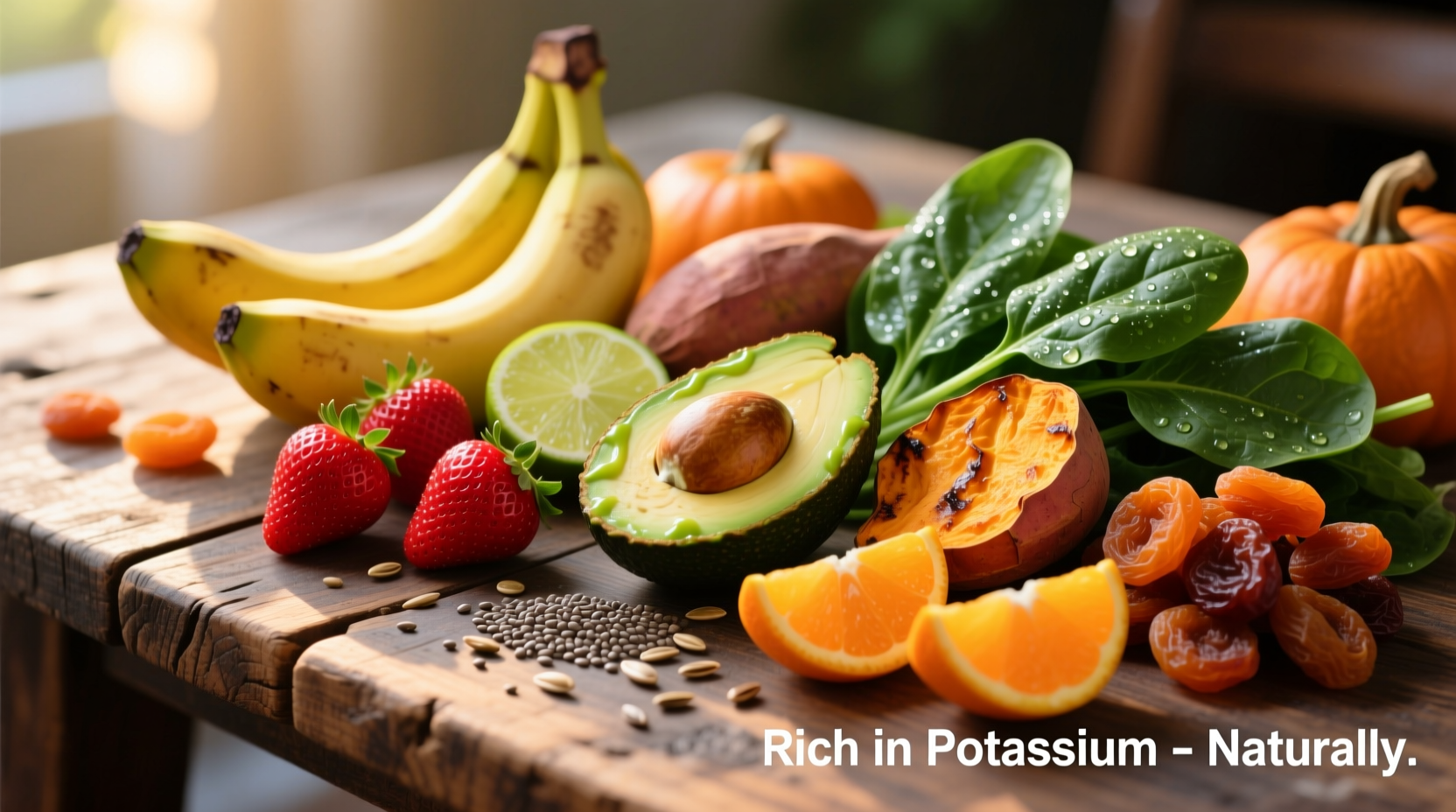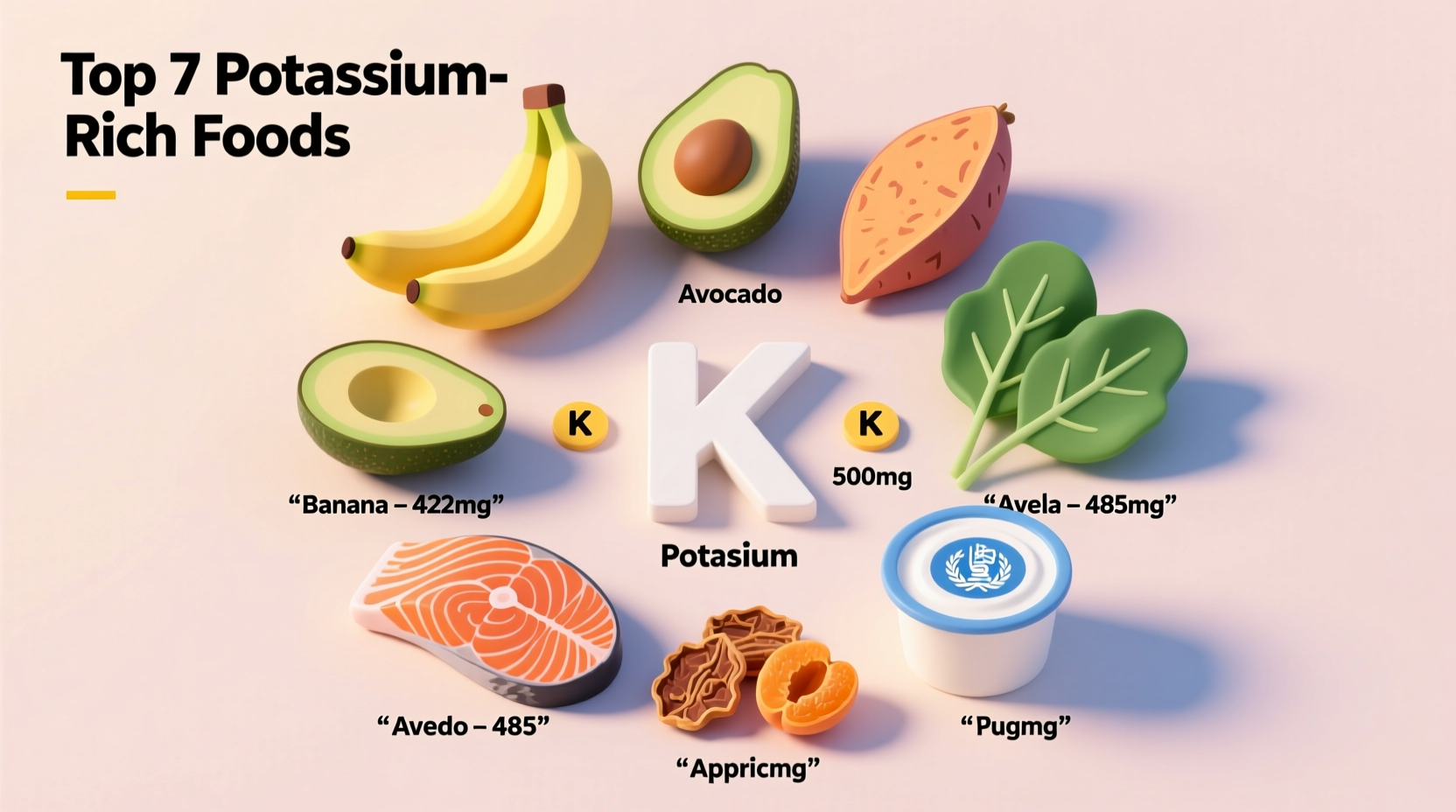Understanding which foods provide potassium is essential for maintaining proper heart function, muscle contractions, and fluid balance in your body. This guide delivers scientifically backed information about the best dietary sources of this critical mineral, helping you make informed choices for better health.
Why Potassium Matters for Your Health
Potassium serves as an essential electrolyte that helps regulate fluid balance, muscle contractions, and nerve signals. According to the National Institutes of Health, adults should consume 2,600-3,400mg of potassium daily. Unfortunately, most Americans only get about half this amount.
Regular consumption of potassium-rich foods can help:
- Lower blood pressure by counteracting sodium effects
- Reduce risk of kidney stones and bone loss
- Support proper nerve and muscle function
- Decrease stroke risk by up to 24% (per American Heart Association research)
Top Potassium Food Sources by Category
Fruits High in Potassium
While bananas often get the spotlight, several fruits actually contain more potassium per serving:
- Avocados - One whole avocado provides approximately 690mg potassium
- Guavas - One cup of guava contains about 688mg potassium
- Cantaloupe - One cup delivers 473mg potassium
- Oranges - One large orange offers 333mg potassium
- Bananas - The familiar medium banana contains 422mg potassium
Vegetables Packed with Potassium
Vegetables generally provide higher potassium concentrations than fruits:
- Sweet potatoes - One medium baked sweet potato (with skin) contains 542mg
- Spinach - One cup cooked spinach delivers 840mg potassium
- Beet greens - One cup cooked provides 1,300mg potassium
- White potatoes - One medium potato (with skin) offers 926mg
- Tomatoes - One cup of tomato puree contains 1,065mg potassium
| Food | Serving Size | Potassium (mg) | % Daily Value |
|---|---|---|---|
| White beans | 1 cup cooked | 1,189 | 34% |
| Salmon | 3 oz cooked | 534 | 15% |
| Yogurt | 1 cup plain | 579 | 17% |
| Coconut water | 1 cup | 600 | 17% |
| Edamame | 1 cup cooked | 676 | 19% |
Practical Ways to Increase Your Potassium Intake
Adding potassium-rich foods to your diet doesn't require drastic changes. Try these simple strategies:
- Start your day right - Add spinach to your morning smoothie or top avocado toast with tomato slices
- Smart swaps - Replace regular pasta with sweet potato noodles or use white beans in place of ground meat in chili
- Snack smarter - Choose banana with almond butter or edamame instead of processed snacks
- Hydrate wisely - Use coconut water as a post-workout beverage instead of sugary sports drinks
According to USDA FoodData Central, cooking methods significantly impact potassium retention. Boiling vegetables can leach up to 50% of their potassium into water, while steaming or microwaving preserves more nutrients. When preparing potassium-rich foods, minimize water exposure and cooking time to maximize nutrient retention.

Special Considerations for Potassium Consumption
While potassium from food sources is generally safe, certain health conditions require special attention:
- Kidney function matters - People with chronic kidney disease may need to limit potassium intake as their kidneys can't remove excess potassium effectively. Consult your healthcare provider for personalized guidance.
- Medication interactions - Potassium-sparing diuretics and some blood pressure medications can increase potassium levels when combined with high-potassium foods.
- Natural vs. supplements - The NIH recommends obtaining potassium from food rather than supplements, as excessive supplemental potassium can cause dangerous heart rhythm abnormalities.
Research published in the Journal of the American College of Cardiology shows that the potassium-potassium ratio in whole foods provides additional health benefits beyond isolated potassium supplements. The natural matrix of foods containing potassium includes other beneficial compounds like fiber, antioxidants, and phytochemicals that work synergistically for optimal health.
Common Potassium Myths Debunked
Several misconceptions persist about potassium-rich foods:
- Myth: Bananas are the best source of potassium
Reality: While convenient, many vegetables and legumes contain significantly more potassium per serving - Myth: All fruits and vegetables have similar potassium levels
Reality: Potassium content varies dramatically—beet greens contain nearly three times more potassium than spinach per serving - Myth: Potassium from supplements is as effective as from food
Reality: Whole food sources provide additional nutrients that enhance potassium absorption and utilization
Building Balanced Potassium-Rich Meals
Create nutrient-dense meals by combining multiple potassium sources:
- Breakfast: Greek yogurt with banana slices and a handful of almonds
- Lunch: Spinach salad with avocado, white beans, tomatoes, and grilled salmon
- Dinner: Baked sweet potato topped with black beans, roasted beet greens, and a side of edamame
These combinations not only boost potassium intake but also provide complementary nutrients that enhance overall nutritional value. For example, the vitamin C in tomatoes improves iron absorption from spinach, while the healthy fats in avocado help your body absorb fat-soluble vitamins from other vegetables.











 浙公网安备
33010002000092号
浙公网安备
33010002000092号 浙B2-20120091-4
浙B2-20120091-4